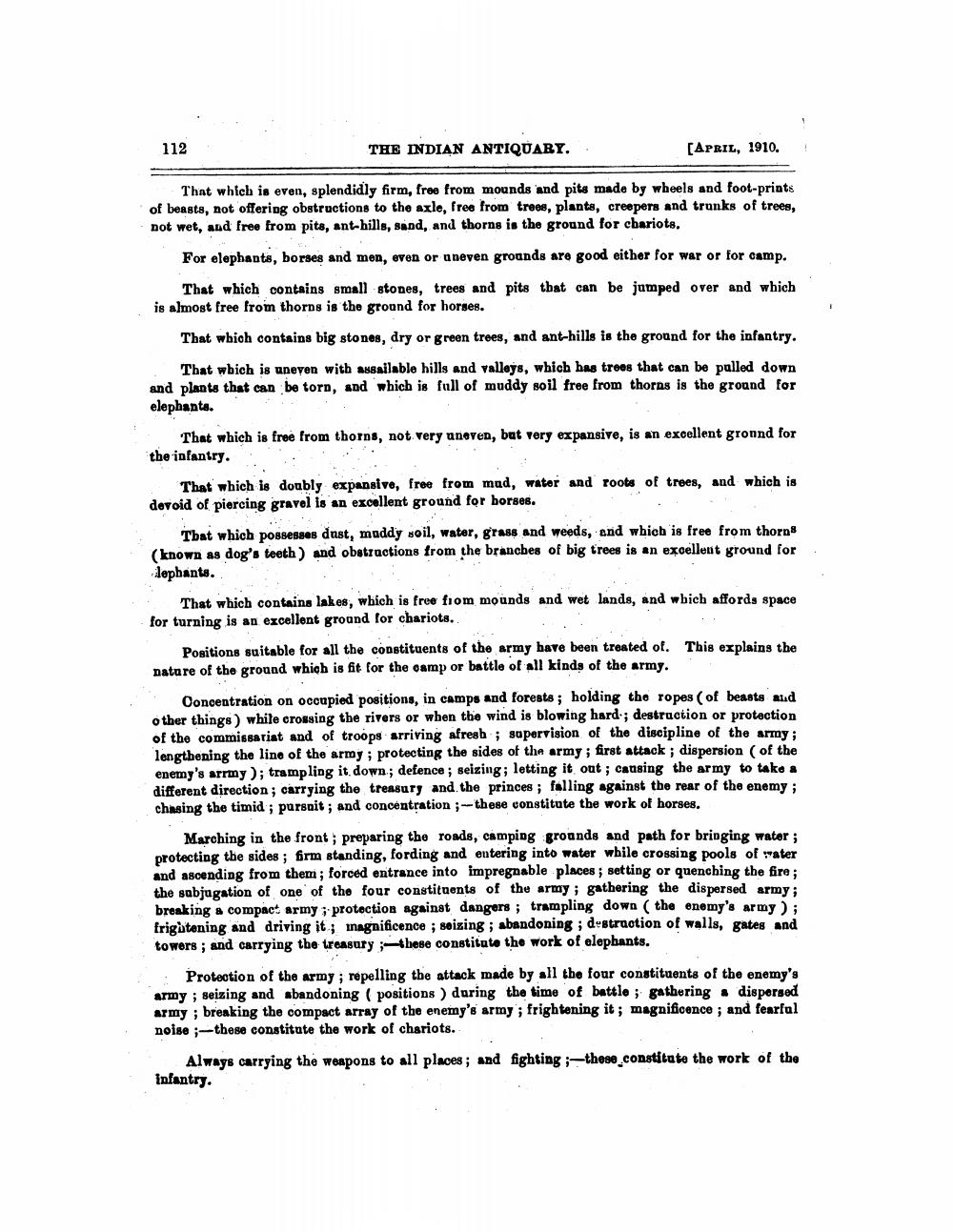________________
112
THE INDIAN ANTIQUABY..
[APRIL, 1910.
Thnt which is even, splendidly firm, free from mounds and pits made by wheels and foot-prints of beasts, not offering obstructions to the axle, free from trees, plants, creepers and trunks of trees, not wet, and free from pits, ant-hills, sand, and thorns is the ground for chariots.
For elephants, borses and men, even or uneven grounds are good either for war or for camp.
That which contains small stones, trees and pits that can be jumped over and which is almost free from thorns is the ground for horses.
That which contains big stones, dry or green trees, and ant-hills is the ground for the infantry.
That wbich is uneven with assailable hills and valleys, which has trees that can be pulled down and plants that can be torn, and which is full of muddy soil free from thorns is the ground for elephante.
That which is free from thorns, not very uneven, but very expansive, is an excellent gronnd for the infantry.
That which is doubly expansive, free from mud, water and roots of trees, and which is devoid of piercing gravel is an excellent ground for horses.
That which possesses dast, maddy soil, water, grass and weeds, and which is free from thorn (known as dog's teeth) and obstructions from the brancbes of big trees is an excellent ground for lephants.
That which contains lakes, which is free from mounds and wet lands, and wbich affords space for turning is an excellent ground for chariots.
Positions suitable for all the constituents of the army have been treated of. This explains the Dature of the ground which is fit for the camp or battle of all kinds of the army.
Ooncentration on occupied positions, in camps and forests; holding tho ropes (of beasts and other things) while crossing the rivers or when the wind is blowing hard; destruction or protection of the commissariat and of troops arriving afresh; supervision of the discipline of the army; lengthening the line of the army; protecting the sides of the army; first attack; dispersion of the enemy's arrmy); trampling it down; defence ; seizing; letting it out ; causing the army to take a different direction; carrying the treasury and the princes ; falling against the rear of the enemy; chasing the timid; pursuit; and concentration ;-these constitute the work of horses.
Marching in the front, preparing the roads, camping grounds and path for bringing water; protecting the sides ; firm standing, fording and entering into water while crossing pools of water and ascending from them; forced entrance into impregnable places ; setting or quenching the fire ; the subjugation of one of the four constituents of the army i gathering the dispersed army; breaking a compact army: protection against dangers ; trampling down ( the enemy's army); frigatening and driving it; magnificence ; soizing; abandoning; destruction of walls, gates and towors; and carrying the treasury ;-these constituto the work of elephants.
Protection of the army; repelling the attack made by all the four constituents of the enemy's army ; seizing and abandoning (positions ) during the time of battle ; gathering « dispersed army ; breaking the compact array of the enemy's army; frightening it; magnificence; and fearful noise ;-these constitute the work of chariots.
eriots.
Always carrying the weapons to all places; and fighting ;-these constitute the work of the infantry.




